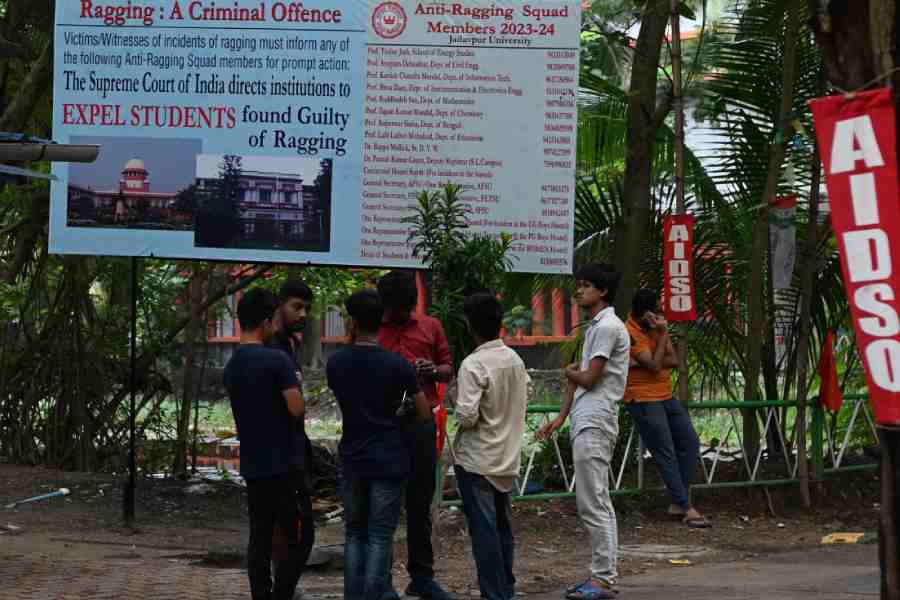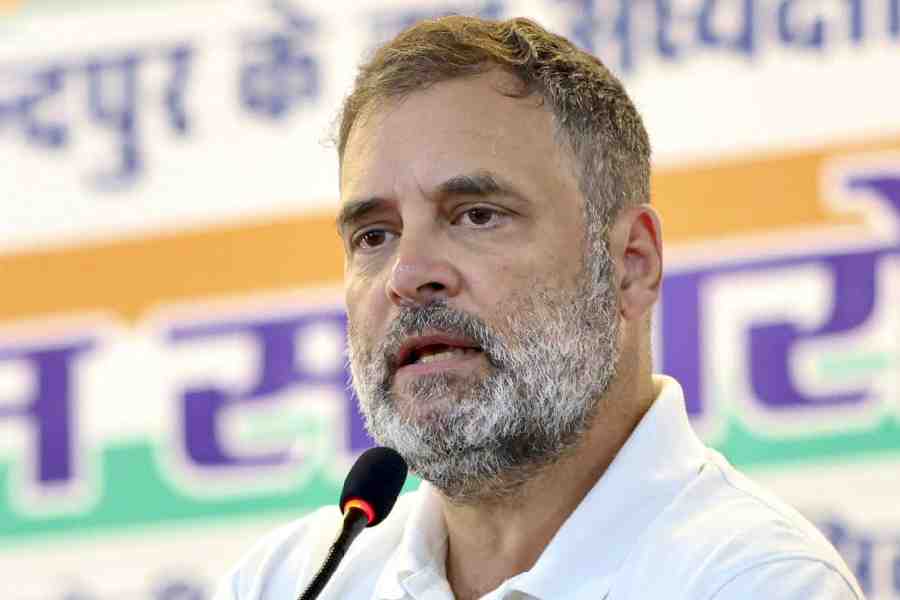There is an understandable sense of outrage all over the country at the tragic death of a first-year undergraduate student of Jadavpur University after a particularly vicious bout of ragging. The young student, who hadn’t even turned 18 at the time of his death last week, had come to Calcutta from Nadia district and his father had somehow managed to secure him shared accommodation — courtesy some senior students — in one of the university hostels. Living away from home for the first time, the toxic ragging culture of the university hostel broke him emotionally and the result was tragic.
Ragging, a brutalised initiation process borrowed from the public schools of pre-1914 England, had acquired its own momentum in India, at least until the authorities stepped in to outlaw it at the turn of the century. However, far from eradicating the menace altogether, the strictures issued by the University Grants Commission drove ragging underground and, in institutions where administrative supervision was lax, made it exceptionally vicious. From all accounts, a few hostels of Jadavpur University have been bastions of vicious ragging and were completely outside the control of the university administration. They operated as veritable ‘liberated’ zones, setting their own rules and standards. The traumatised boy who couldn’t cope with the pressures of the liberated behaviour of his seniors was either wilfully pushed to his death or met with a horrible accident while trying to escape his tormentors.
Last week’s tragedy has naturally focused attention on a toxic student culture that appears to happily co-exist with self-deluding pretensions of liberation and enlightenment. Thanks to a bout of media over-inquisitiveness, it is now emerging that the writ of the university authorities did not extend to the hostels of the university. The superintendent of the hostel where the young boy met his end had, for example, been barred from inspecting the rooms of students for the past decade, at least. On the previous occasion (sometime in 2014) he tried to discharge his duties, he was held hostage by the students all night and released in the early hours of the morning after he signed a declaration that he had entered the hostel to steal mobile phones of students. On the day of the tragedy, the local police could not enter the hostel because the gate had been locked to prevent their entry.
That such a situation could prevail in the heart of Calcutta may seem unbelievable. It is, however, a commentary on the state of lawlessness that has been allowed to jeopardise higher education in West Bengal. At present, Jadavpur University does not have a vice-chancellor, thanks to a contrived stand-off between the Trinamul Congress-led state government and a governor who is guided by his own flights of whimsy. However, even the registrar who was nominally in charge of running the university administration made herself conveniently absent for three days after the tragedy and only returned to work following a wave of public indignation. The registrar and other functionaries have not been able to satisfactorily explain how and why the hostels of Jadavpur University became no-go areas for the authorities.
The silence of the administration tells its own story. For more than a decade, Jadavpur University has been rocked by student unrest over issues that may seem bizarre to those outside a particular political ecosystem. These include the absolute insistence on the part of a vocal section of student activists that no CCTV cameras should be installed in the campus. The argument was that a culture of surveillance negated the freedom that should define a campus. To what extent this was a genuine apprehension of impressionable minds or a self-serving argument of those who view campuses as political laboratories is a matter of conjecture. However, it is a fact that the absence of this elementary form of security surveillance has delayed (and may possibly stall) the investigations into the death of the student. The complete absence of any vigilance included an unwritten instruction to the local police to avoid getting involved with the campus. This may explain why, according to former students who are now rushing to the media with their horror stories, the campus became a centre of drugs and illicit drinking after dark. What is interesting is that the university authorities have been encouraged by the state government to take the line of least resistance. In other words, youthful excesses have been recklessly indulged in as the price of an ignoble peace.
There was, it would seem, a very thin line separating the exuberance of personal and intellectual liberation and very real criminality. Politics in Jadavpur University, it is said, has involved a tussle among different shades of Left, all of whom accuse their rival groups of waving the red flag to attack the red flag. The overdose of wall graffiti inside the campus suggests that most of the students’ concerns are very far removed from the preoccupations of the outside world. This isn’t an unusual phenomenon, and the town-gown divide is a defining feature of university campuses all over the West. However, what is striking is that political affiliations have become expedient covers for a multitude of other sins. The hostel, which is at the centre of the ragging controversy in Jadavpur University, is claimed by those in the know of left-wing sectarian thinking, to be a stronghold of an ultra-Left group hostile to the Communist Party of India (Marxist). The CPI(M) student wing, on the other hand, has insisted that the extreme Left and Maoist groups have been used by the ruling Trinamul Congress for its own ends. These include the ‘no vote to BJP’ campaign in 2021 that was mounted by the far Left prior to the assembly election. There is also a suggestion that the state government will somehow allow the presiding deities of the hostel mafia to escape the clutches of the law for past services rendered.
The death of a bewildered student from the districts is a high price to pay for the accumulated debris to be cleared from a university that, despite everything, is still an asset for West Bengal. But this can happen if the message gets through that public-funded institutions are also accountable to the people who pay the taxes. They cannot be reduced to private fiefdoms of fringe bodies whose commitment to the national ethos is suspect. If Indian universities don’t respect ordinary decencies, they should be compelled to do so.











